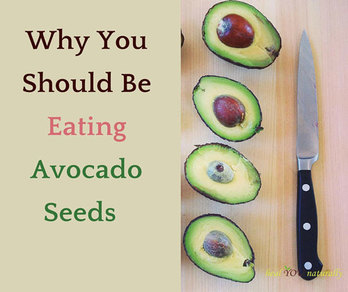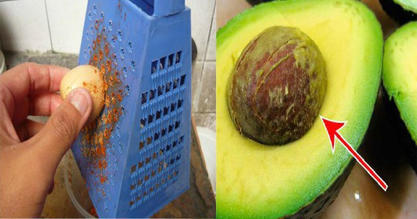The Power of Avocado
Eating the fresh Avocado:
Avocado is a lot of people’s favorite fruit, and this isn’t the case with Americans only, but with people from many other countries as well. This tasty fruit contains a lot of nutrients and so it offers numerous health-benefits.
Additionally, numerous studies have shown that people who consume avocados regularly have lower Body-Mass-Index and better nutrient intake when compared to those who don’t eat avocados frequently.
Additionally, numerous studies have shown that people who consume avocados regularly have lower Body-Mass-Index and better nutrient intake when compared to those who don’t eat avocados frequently.
Here is what 1 Avocado a day can do to your body:
|
1 - It’s a Healthy fat The avocado is virtually the only fruit that has monounsaturated fat (good-fat). According to the Dietary Guidelines for Americans, good-fats are those that can lower bad-cholesterol levels, reduce the risk of heart-attack and stroke. So instead of mayonnaise why not spread some Avocado on your toast and sandwiches.
2 - Helps lose weight According to a study published in the Nutrition Journal, ½ avocado with lunch can be of great help for overweight individuals as it keeps you satiated for a longer period of time. According to the participants in the study, they had 40% lesser desire for eating for more than 3-hours and 28% lesser desire for eating 5-hours after a meal. |
|
3 - Reduces Cholesterol level Statistically speaking, 1 in 3 American adults suffer from problems related to high cholesterol levels which only double the risk of cardiovascular diseases. However, there are natural ways to lower high cholesterol-levels. Studies have shown that regular consumption of avocado is an excellent way to decrease cholesterol-levels. Avocado has the amazing power to lower blood-triglycerides and cholesterol levels, as well as to lower LDL cholesterol levels and to increase HDL levels.
4 - Avocardo is rich in nutrients Avocados have an abundance of nutrients and each serving has more than 20-vitamins and minerals. Through consumption of one avocado you intake the following recommended daily values: 33% of vitamin-C, 21% of vitamin-E, 26% of vitamin-B6, 53% of vitamin-K, 19% of copper, 41% of folate, 28% of potassium, and 28% of pantothenic-acid.
4 - Avocardo is rich in nutrients Avocados have an abundance of nutrients and each serving has more than 20-vitamins and minerals. Through consumption of one avocado you intake the following recommended daily values: 33% of vitamin-C, 21% of vitamin-E, 26% of vitamin-B6, 53% of vitamin-K, 19% of copper, 41% of folate, 28% of potassium, and 28% of pantothenic-acid.

5 - Prevents diabetes According to the Centers for Disease Control and Prevention, at one point in our lives, diabetes is going to affect around 40% of people in USA. In order to minimize this risk, you must balance your blood-sugar levels. One study showed that participants who were given ½ avocado with their lunch, and had their insulin and blood-glucose levels checked at intervals, raised their carb and calorie intake, but showed no increase in the blood-sugar levels, unlike those who didn’t consume an avocado with lunch.
6 - Improves Bone health Avocados are rich in Vitamin-K, folate, copper, and numerous other nutrients. When regularly consumed, avocados help in the building and maintenance of strong bones.
7 - Helps in Digestion Avocados keep the digestive-system working smoothly. A single avocado has 13 grams fiber which is 54% of the daily recommended fiber.
8 - It is Anti-Carcinogenic According to a study, avocado may be helpful in inhibiting or stopping prostate-cancer cell growth. Another study pointed out that avocados can be significant in the reduction of chemotherapy side-effects.
6 - Improves Bone health Avocados are rich in Vitamin-K, folate, copper, and numerous other nutrients. When regularly consumed, avocados help in the building and maintenance of strong bones.
7 - Helps in Digestion Avocados keep the digestive-system working smoothly. A single avocado has 13 grams fiber which is 54% of the daily recommended fiber.
8 - It is Anti-Carcinogenic According to a study, avocado may be helpful in inhibiting or stopping prostate-cancer cell growth. Another study pointed out that avocados can be significant in the reduction of chemotherapy side-effects.
The Avocado Seed:
You’re probably already aware that avocados are one of the most nutritious foods around – these creamy fruits are great for weight loss, healthy-skin and hair, balanced blood sugar levels, increased nutrient absorption and digestive health. However, most avocado lovers aren’t aware that they are throwing away the most nutritious part of the fruit – the seed!
Yes, you can eat that big, brown rock-like seed that represents up to 20% of the whole avocado.
Yes, you can eat that big, brown rock-like seed that represents up to 20% of the whole avocado.
Important to know:
The avocado has been all the rage lately with every type of avocado toast you can imagine being found at nearby cafes. Additionally, avocados offer the benefits of healthy fat — something keto diet fans crave. But what about the avocado seed? Before you toss that seed, you may want to tune in to what it can do for you, such as providing amazing antioxidants, possibly helping reduce the risks of Alzheimer’s and lowering pain from toothaches. It also may aid in the treatment of diabetes, constipation and diarrhea, and arthritis — not to mention its antifungal properties, collagen benefits, cholesterol-lowering effects and more -- making it the latest and greatest super-seed.
There is another side to this story that you need to consider, however. Are avocado seeds edible? The California Avocado Commission specifically states that there is not enough data to know just how good the avocado seed is for you. Basically, it recommends avoiding it for now and suggests that sticking with the amazing nutrition found in the avocado flesh is a far better choice.
On the other hand, research is being conducted. One study indicates that evidence leans on the side of it being a healthy alternative to consume and use with cosmetics. Below I share what I have found so that you can decide for yourself, but always take precautions when trying anything new or anything that has not been supported by enough data prior to consuming.
There is another side to this story that you need to consider, however. Are avocado seeds edible? The California Avocado Commission specifically states that there is not enough data to know just how good the avocado seed is for you. Basically, it recommends avoiding it for now and suggests that sticking with the amazing nutrition found in the avocado flesh is a far better choice.
On the other hand, research is being conducted. One study indicates that evidence leans on the side of it being a healthy alternative to consume and use with cosmetics. Below I share what I have found so that you can decide for yourself, but always take precautions when trying anything new or anything that has not been supported by enough data prior to consuming.
How to Eat Avocado Seed?
- After removing it from the avocado, Rinse and dehydrate at 250 degrees Fahrenheit for 2-hours.
- Take it out, remove the outer skin and place it on the counter.
- Press on the dried seed with the back of a thick knife blade; the pit will split in two.
- Dice the pit halves then put into a high-powered blender, and pulse until it has turned into a powder.
- Add them to your smoothies, Oatmeal and baking.
Potential Avocado Seed Benefits:
|
1 - Show Promising Antitumor Activity
According to the Leung’s Encyclopedia of Common Natural Ingredients, the avocado seed contains biscatechin, a condensed flavanol. One study isolated biscatechin from avocado seeds and tested in mice and rats. The biscatechin was shown in vitro to have antimicrobial activity and antitumor effects on the animals. Another study published in the American Journal of Chinese Medicine noted catechin as a flavanol that offers various health benefits, such as neuroprotection, antioxidation, antitumor and antihepatitis characteristics. The falvanol shows that is is capable of suppresses inflammation in possible cancerous cells. |
|
2. Great Antioxidant Source
Did you know that the avocado seed is a great antioxidant? According to a study performed at the National University of Singapore, the avocado seed offers more antioxidant activity than some more commonly eaten fruit parts. In fact, the study shares that the seeds may actually contain more than 70 percent of the antioxidants found in the entire fruit. That makes the avocado seed a powerful antioxidant resource.
3 - May Help Patients with Alzheimer’s
Alzheimer’s disease affects the brain and is considered one of the most neurodegenerative diseases on the planet. Many studies have been conducted to review the phytochemical contents of the avocado seed.
An evaluation published in the Journal of Basic and Clinical Physiology and Pharmacology showed the evidence of saponins, alkaloids and terpenoids in the extracts of the avocado seed. According to the researchers, these phytochemicals may offer a natural approach to helping manage the affects of Alzheimer’s disease, concluding “The anti-cholinesterase and antioxidant activities of avocado leaf and seed could be linked to their phytoconstituents and might be the possible mechanisms underlying their use as a cheap and natural treatment/management of AD. However, these extracts should be further investigated in vivo.”
4 - Can Help Balance Cholesterol Levels
The avocado seed is one of the top high-fiber foods on the planet, and we know fiber can help balance cholesterol levels. That may be why research shows avocado seeds can lower cholesterol.
Research from Penn State University’s Department of Food Science details the benefits the avocado seed has on cardiovascular health, noting:
avocado seeds may improve hypercholesterolemia, and be useful in the treatment of hypertension, inflammatory conditions and diabetes. Seeds have also been found to possess insecticidal, fungicidal, and anti-microbial activities.

5 - Works as a Natural Food Dye
Since conventional food coloring and food dyes contain chemical-based ingredients, it is best to go with natural options. You may have heard of beets being used to create a reddish color, for example.
Research has discovered that when crushed and blended with water, the avocado seed develops an orange color.
This is great news since so many foods, especially food for children, are loaded with toxic dyes. Specifically, the numbered colors FD&C blues #1 and #2, green #3, red #3; and yellows #5 and #6 are synthetic or artificial colors. These colors are made from coal tar or petroleum and can cause all sorts of problems for your health, such as allergies, asthma, hyperactivity and cancer. In fact, artificial food dyes have been banned in the U.K.
6 - May Help Eliminate Microbial Growth
The residue of the seed of the avocado is rich in polyphenols, making the seeds powerful antioxidants and antimicrobials. Among the polyphenols are catechin, epicatechin, and chlorogenic and protocatechuic acid. This residue has been applied to pork burgers in studies, showing the residue of the avocado seed to be effective in preventing oxidation and microbial growth.
Another study showed the effects that ground avocado has on meat. For a period of eight days, ground beef was observed containing 0.5 percent seed powder and 0.1 percent of lyophilized extract. Little oxidation occurred meaning the protection was higher than 90 percent. To note, the study indicates that avocado oil, added directly to the pork burgers, had a similar effect.
Source: https://draxe.com/avocado-seed/
Since conventional food coloring and food dyes contain chemical-based ingredients, it is best to go with natural options. You may have heard of beets being used to create a reddish color, for example.
Research has discovered that when crushed and blended with water, the avocado seed develops an orange color.
This is great news since so many foods, especially food for children, are loaded with toxic dyes. Specifically, the numbered colors FD&C blues #1 and #2, green #3, red #3; and yellows #5 and #6 are synthetic or artificial colors. These colors are made from coal tar or petroleum and can cause all sorts of problems for your health, such as allergies, asthma, hyperactivity and cancer. In fact, artificial food dyes have been banned in the U.K.
6 - May Help Eliminate Microbial Growth
The residue of the seed of the avocado is rich in polyphenols, making the seeds powerful antioxidants and antimicrobials. Among the polyphenols are catechin, epicatechin, and chlorogenic and protocatechuic acid. This residue has been applied to pork burgers in studies, showing the residue of the avocado seed to be effective in preventing oxidation and microbial growth.
Another study showed the effects that ground avocado has on meat. For a period of eight days, ground beef was observed containing 0.5 percent seed powder and 0.1 percent of lyophilized extract. Little oxidation occurred meaning the protection was higher than 90 percent. To note, the study indicates that avocado oil, added directly to the pork burgers, had a similar effect.
Source: https://draxe.com/avocado-seed/
NOTE: The materials and the information contained on Natural ways channel are provided for general and educational purposes only and do not constitute any legal, medical or other professional advice on any subject matter. None of the information on our videos is a substitute for a diagnosis and treatment by your health professional. Always seek the advice of your physician or other qualified health provider prior to starting any new diet or treatment and with any questions you may have regarding a medical condition. If you have or suspect that you have a medical problem, promptly contact your health care provide.








